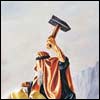Joel Cohen's Question:
When, in March 2001, Mullah Mohammed Omar of the Taliban directed the dynamiting of the Buddha statues carved into the mountain-faces of Bayman, Afghanistan, the world was aghast—perhaps even the observant Jewish world. Even accepting the Taliban's supposed "justification" that there was no longer a Buddhist population in Afghanistan, the Mullah's claim that they were "idolatrous" fell on the world's deaf ears. Seemingly rightly so. How could it, indeed, be a justification—did the Taliban, did Islam, not have sufficient faith in the Muslims' belief in Allah to allow such a seemingly barbaric act?
But yet, G‑d directed the Israelites to do precisely the same thing. Explaining that the Israelites would conquer the nations little by little, G‑d ordered that when they did conquer them, the carved images of their idols should be burnt in fire—"lest you be ensnared by" an abomination. Presumably Sharia law sees it exactly the same way.
We moderns are exceedingly disturbed by the narrow-mindedness (or worse) of what the Taliban insists on. But at the same time we seem at ease with what Moses was directed to do by G‑d Himself, not simply some latter-day decisor of G‑d's Law.
Is this the only way G‑d could deal with the difficult problem of the Israelites' temptation by idolatry?
Rabbi Adam Mintz Responds:
The Book of Deuteronomy contains certain points of emphasis. One of these points is G‑d's command to the people of Israel to destroy all of the idols that they find in the Land of Israel upon entering and conquering it.
It is often difficult for people living in the twenty-first century to appreciate the risks of idols as they do not constitute our primary, or even secondary, temptation any more. Actually, the Talmud writes that the temptation of idolatry no longer exists (unlike the temptation posed by illicit sexual acts, which remains very much alive and vibrant).
If we accept the premise that people in the ancient world were easily enticed to worship idols, G‑d's command to destroy the idols makes perfect sense. You raised the question about whether or not G‑d should trust the Jews as they enter the Land of Israel. What in the story of the forty-year journey in the desert would give G‑d confidence in the Jew's ability to withstand the temptation of idolatry? They worshipped the golden calf, they were enticed by the people of Midian and they questioned G‑d's power at almost every turn. G‑d was bringing the people into the land and empowering them to create their own society without constant divine intervention that they had gotten used to in the desert. In order to improve the chances of success, G‑d needed to remove a major impediment, the idols of the nations.
With their entry in to the Land of Israel, they needed to remove all idols. Only then did they have a fighting chance to create a society committed to G‑d and His Torah.
Rabbi Eli Popack Responds:
Imagine this:
Deep in the South of the USA there is a large statue depicting a white plantation owner mercilessly beating his slave. This magnificent statue has stood for more than two hundred years.
Should we destroy it?
What about the statue of Saddam that the Iraqis destroyed seven years ago? Do you condemn those who gleefully pulled it down?
If something is offensive to the point of disgust, why should it not be destroyed?
A statue of a Buddha is a slap in the face of G‑d—according to Islam, and Judaism, too. So I can not pass judgment on the Muslim who felt the need to destroy it.
I would suggest that those who have problems with the destruction of idols, it is due to the fact that they do not appreciate how offensive they are to a monotheist.
As for the Torah's directive to destroy the idols:
The Jewish nation was to be the new owners of the Land and all that was in it. An idol is not a nice harmless souvenir. It is a spit in G‑d's face, the G‑d who lovingly took them out of Egypt, gave them His precious Torah, fought their wars, etc.
Is it mentchlich to leave them around?
Taking this a step further, all would agree that a "harmless" idol has no place in a synagogue, a place of holy worship. The Holy Land, which the Torah refers to as "a land that the L-rd, your G‑d, looks after; the eyes of L-rd your G‑d are always upon it," is, in effect, the "synagogue of the world." An idol can not be allowed within its borders.





